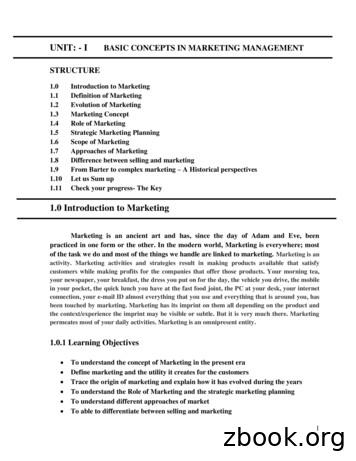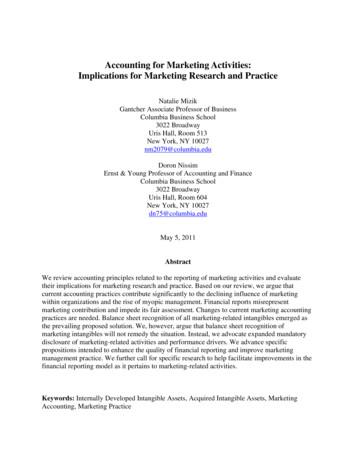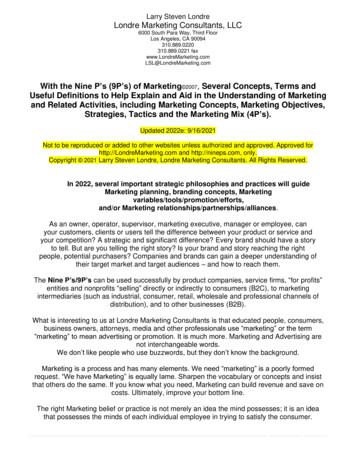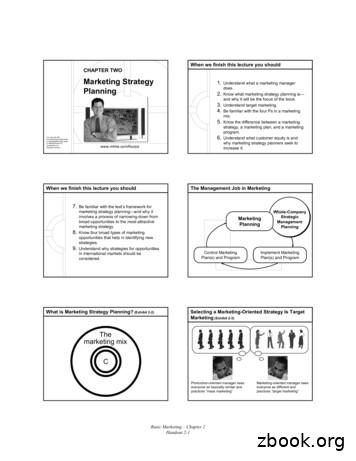A Project Report On Marketing & Sales In YAMAHA At Mahesh .
“A Project Report On Marketing & Sales inYAMAHA at Mahesh Motors ”A Summer Training Project Report SubmittedIn Partial Fulfillment Of The Requirements For TheAward Of Degree OfMASTER OF BUSINESS ADMINISTRATIONACADEMIC SESSION (2013-2015)Submitted By:Guided By:Prateek KapilMrs.AnuradhaYesugadeBHARTI VIDYAPEETH DEEMED UNIVERSITYINSTITUTE OF MANAGEMENT AND
ENTREPRENEURSHIPDEVELOPMENT, ERANDWANE, PUNE-411038COMPANY CERIFICATEThis is to certify that the project report entitled “Marketing &Sales in YAMAHA at Mahesh Motors ” Submitted to theBharati Vidyapeeth Deemed University, Pune in partial fulfillmentof the requirement for the award of degree of MBA is an originalwork carried out by Mr Prateek Kapil under the guidance of MrARUN KUMAR. The matter embodied in this project is a genuinework done by Prateek Kapil to the best of my knowledge andbelief and has not been submitted before, neither to thisuniversity nor to any other university for the fulfillment of therequirement of any course of study.Signature of the StudentSignature of the Guide
CERTIFICATEThis is to certify that the project titled Marketing & Sales inYAMAHA at Mahesh Motors is an academic work done byPrateek Kapil submitted in partial fulfillment of therequirement for the award of degree of MBA BhartiVidyapeeth Deemed University ,Pune .it has been completedunder the guidance of Mrs. ANURADHA YESUGADE. WEare thankful to Mahesh Motors for having allowed ourstudent to undergo project work training .The authencity ofthe project work will be examined by the viva examinerwhich includes data verification, checking duplicity ofinformation etc. and it may be rejected due to non fulfillmentof quality standards set by the Institute.DR SACHIN S. VERNEKAR(DIRECTOR IMED)
DECLARATIONI hereby declare that all the information that has beencollected, analyzed and documented for the project isauthentic possession of mine.I wouldneithermeans.alreadylike to categorically mention that the work here hasbeen purchased nor acquired by any other unfairHowever, for the purpose of the project, informationcompiled in many sources has been utilized.PRATEEK KAPIL
ACKNOWLEDGEMENTNo small task however can be completed without properguidance and encouragement. It gives me great pleasure toexcess my deep sense of gratitude and reverence to everyperson who directly or indirectly has helped to create acongenial atmosphere for successfully completion of thisproject report.I would like to extend my sincere thanks to Mr Arun Kumarmy project guide for his guidance and support through mytraining at Mahesh Motors. His calm demeanour andwillingness to teach has been a great help in successfulcompletion of my project. My learning has beenimmeasurable and working under them was a greatexperience .My sincere thanks also extend to all the staffs ofMahesh Motors. For providing a hospitable and helpful workenvironment and making my summer training an excitingand memorable event.My heartful thanks are also towards the guide of myinstitute. Mrs. Anuradha Yesugade without her continues helpand enthusiasm the project would not have beenmaterialized in the present formFinally I also wish to thank the DR Sachin Venekar, DirectorIMED Pune for making this experience of summer training inan esteemed organization Mahesh Motors. The learningfrom this experience has been immense and would becherished throughout life.
Mr. Prateek KapilCHAPTER 1: INTRODUCTIONAUTOMOBILE INDUSTRYIndian automobile industry has grown leaps and bounds since 1898, atime when a car had touched the Indian streets for the first time. Atpresent it holds a promising tenth position in the entire world withbeing number two in two wheelers and fourth in commercial vehicles.With standing a growth rate of 18% per annum and an annualproduction of more than 2million units, it may not be an exaggerationto say that this industry in the coming years will soon touch a figure of10 million units per year. Besides a steady growth in India's fiscalsystem, the expansion of Indian middle class has also played a majorrole in drawing the attention of international auto manufacturerstowards the Indian Automobile Market. Forever, India is one nationwhich provides skilled workforce at cut-throat prices making itself apreferable manufacturing centre. The magnetism of the Indian marketsand the decline of global auto industries such as Japan, Europe and UShave triggered the influx of new conglomerates along with huge capitalinvestments in the sector.Indian Two-Wheeler IndustryIndia is the second largest producer and manufacturer of two-wheelersin the world. Indian two-wheeler industry has got spectacular growth inthe last few years. Indian two-wheeler industry had a small beginningin the early 50's. The Automobile Products of India (API) startedmanufacturing scooters in the country. Bikes are a major segment ofIndian two wheeler industry, the other two being scooters and mopeds.Indian companies are among the largest two-wheeler manufacturers inthe world .Hero Honda and Bajaj Auto are two of the Indian companiesthat top the list of world companies manufacturing two-wheelers.Foreign collaborations have been playing a major role in the growth ofthe Indiantwo-wheeler market , and most of them are Japanese firms. Themodern two- wheeler firms in India have been manufacturing new
categories of two wheelers such as Step- Through and Scooters. Thesehave been produced by combining two or more two-wheeler segments.Foreign firms have already taken initiatives to own their two-wheelersubsidiaries in India. The two-wheeler market was opened to foreigncompanies in the mid 1980s. The openness of Indian market to foreigncompanies led to the arrival of new models of two-wheelers into India.Easy availability of loans from the banks, relatively low rate of interestand the discount of prices offered by the dealers and manufacturerslead to the increasing demand for two-wheeler vehicles in India. Thisled to the strong growth of Indian automobile industry. Kinetic Hondawas introduced in the Indian market during the mid 80s. The mainfeature of Kinetic Honda was its ease of use. This helped theyoungsters and the women to buy scooters Major players in the 2wheeler industry are Hero Honda Motors Ltd (HHML), Bajaj Auto Ltd(Bajaj Auto) and TVS Motor Company Ltd (TVS). The other key playersin the two-wheeler industry are Yamaha Motors India Ltd (Yamaha),Royal Enfield Ltd (REL) and Honda Motorcycle & Scooter India (P) Ltd(HMSI).OVER VIEW OF YAMAHA MOTORS PVT. LTD.Yamaha Motor Co., Ltd.FoundedJuly 1, 1955Capital85,753 million yen (as of March 31, 2015)PresidentHiroyuki YanagiEmployees(Consolidated)52,662 (as of December 31, 2014)Parent :10,377(as of December 31, 2014)Headquarters2500 Shingai, Iwata-shi, Shizuoka-ken, JapanGroup Companies
Consolidated subsidiaries: 107Non-consolidated subsidiaries: 4 (by the equity method)Affiliates: 26 (by the equity method)Sales (from January 1, 2014 to December 31, 2014)Consolidated1,521,207 million yenParent597,577 million yenSales Profile (Consolidated)by Regionby Product Category
Profile Of The OrganizationABOUT INDIA YAMAHA MOTOR PVT. LTD.Yamaha made its initial foray into India in 1985. In August 2001, Yamaha Motor Indiabecame a 100% subsidiary of Yamaha Motor Co., Ltd, Japan (YMC). In 2008, Mitsui &Co., Ltd. entered into an agreement with YMC to become a joint-investor in the company"India Yamaha Motor Private Limited (IYM)". IYM's manufacturing facilities compriseof 2 State-of-the-art Plants at Surajpur (Uttar Pradesh) and Faridabad (Haryana). Theinfrastructure at both the plants supports production of motorcycles and parts for thedomestic as well as overseas markets.With a strong workforce of more than 2,300 employees, IYM is highly customer-drivenand has a countrywide network of over 1200 customer touch-points including 400dealers. Presently, its product portfolio includes YZF-R15 Version 2.0 (149.8cc), Fazer(153cc), Fazer Version 2.0 (149cc), FZ-S (153cc), FZ-S FI Version 2.0 (149 cc), FZ(153cc), FZ FI Version 2.0 (149 cc), SZ-S & SZ-RR (153cc), SZ - RR Version 2.0 (149cc), Saluto (125cc), SS125 (123cc), YBR125 (123cc), YBR110 (106cc), Crux (106cc) andScooters Ray (113cc), Ray Z (113cc), Alpha (113cc) and Fascino(113cc). Its importportfolio includes VMAX (1,679cc), YZF-R1M (998 cc), YZF-R1 (998cc) and FZ1(998cc).The other Yamaha Motor Group Companies in India include:Yamaha Motor India Pvt. Ltd. (YMI) is a 100% subsidiary of YMC and functions asthe regional headquarters and corporate control body of India business operations forYMC. YMI is responsible for Corporate Planning & Strategy, Business Planning &Business Expansion and Quality & Compliance Assurance of Yamaha India Business.Yamaha Motor India Sales Pvt. Ltd. (YMIS) is a 100% subsidiary of YMC. YMIS isestablished by YMC to provide Sales & Marketing services to IYM. Headquartered inChennai, YMIS supports IYM to market and sell its motorcycles & scooters in domesticas well as export markets.
Yamaha Motor Research & Development India Pvt. Ltd. (YMRI) is a 100%subsidiary of YMC. YMRI is established by YMC to provide R&D and Productdevelopment services to IYM. Headquartered in Surajpur, Gautam Budh Nagar (U.P.),YMRI is engaged in developing new products for IYM for its domestic as well as exportmarkets. YMRI is the fifth overseas R&D headquarters for Yamaha Motor Groupfollowing Italy, Taiwan, China, and Thailand.VISIONWe will establish YAMAHA as the "exclusive & trusted brand" of customers by "creatingKando" (touching their hearts) - the first time and every time with world class products &services delivered by people having "passion for customers".MISSIONWe are committed to:Be the Exclusive & Trusted Brand renowned for marketing and manufacturing ofYAMAHA products, focusing on serving our customer where we can build long termrelationships by raising their lifestyle through performance excellence, proactive design& innovative technology. Our innovative solutions will always exceed the changing needsof our customers and provide value added vehicles.Build the Winning Team with capabilities for success, thriving in a climate for action anddelivering results. Our employees are the most valuable assets and we intend to developthem to achieve international level of professionalism with progressive careerdevelopment. As a good corporate citizen, we will conduct our business ethically andsocially in a responsible manner with concerns for the environment.Grow through continuously innovating our business processes for creating value andknowledge across our customers thereby earning the loyalty of our partners & increasingour stakeholder value.CORPORATE SOCIAL RESPONSIBILITY POLICYCorporate Social Responsibility (CSR) is strongly connected with the principles ofsustainability; an organization should take decisions based not only on financial factors,but also on the social and environmental consequences. Therefore, it is the core corporateresponsibility of India Yamaha Motor Private Limited (hereinafter referred to as "theCompany") to practice its corporate values through its commitment to grow in a sociallyand environmentally responsible way, while meeting the interests of its stakeholders.CSR is the continuing commitment by business to perform ethically and contribute toeconomic development while improving the quality of life of the workforce and theirfamilies as well as of the local community and society at large. CSR is clearly on capacitybuilding, empowerment of communities, inclusive socio-economic growth, environmentprotection, promotion of green and energy efficient technologies, development ofbackward regions, and upliftment of the marginalized and under-privileged sections of thesociety.As a corporate entity, the Company recognizes that its business activities have wideimpact on the societies in which it operates, and therefore an effective practice is required
giving due consideration to the interests of its stakeholders including shareholders,customers, employees, suppliers, business partners, local communities and otherorganizations. The Company endeavour to make CSR a key business process forsustainable development. The Company is responsible to continuously enhanceshareholders wealth and it is also committed to its other stakeholders to conduct itsbusiness in an accountable manner that creates a sustained positive impact on society. TheCompany is committed towards aligning with nature; and has adopted eco-friendlypractices.Essentially, CSR, which is deliberate inclusion of public interest into corporate decisionmaking by undertaking different projects for development of society, has the potential ofcontributing significantly in the long run to socio-economic growth in the backwardregions and other sections of the society. The emerging concept of CSR goes beyondcharity and requires the Company to act beyond its legal obligations and to integratesocial, environmental and ethical concerns into the Company's business process.In April 2013, IYM established 2 functionally independent entities namely Yamaha MotorIndia Sales Pvt. Ltd. (YMIS) that will cater to the sales and marketing needs of thecompany and Yamaha Motor Research and Development India Pvt. Ltd. (YMRI) that isintended to increase Yamaha's manufacturing competitiveness through the establishmentof an R&D headquarters in India.CSR does not emanate directly from external demands but from organizationallyembedded processes. These processes prompt the organization to view its relationshipswith stakeholders in a different perspective, which in turn influences its engagement withthem. The Board of Directors of the Company has devised social responsible businesspractices under the general rules issued by the Ministry of Corporate Affairs forcompulsory implementation of CSR activities.HistoryOVERVIEW - INDIAN AUTOMOBILE INDUSTRYOver a period of more than two decades the Indian Automobile industryhas been driving its own growth through phases. The entry of SuzukiCorporation in Indian passenger car manufacturing is often pointed asthe first sign of India turning to a market economy. Since then theautomobile sector witnessed rapid growthyear after year. By late-90's the industry reached self reliance in engineand component manufacturing from the status of large scale importer.With comparatively higher rate of economic growth rate index againstthat of great global powers, India has become a hub of domestic andexports business. The automobile sector has been contributing itsshare to the shining economic performance of India in the recent years.With the Indian middle class earning higher per capita income, morepeople are ready to own private vehicles including cars and twowheelers. Product movements and manned services have boosted inthe sales of medium and sized commercial vehicles for passenger andgoods transport. Side by side with fresh vehicle sales growth, the
automotive components sector has witnessed big growth. Thedomestic auto components consumption has crossed rupees 9000crores and an export of one half size of this figureOverview Of Automobile IndustryThe Indian automobile industry is going through a technologicalchange where each firm is engaged in changing its processes andtechnologies to sustain the competitive advantage and providecustomers with the optimized products and services. Starting fromthe two wheelers, trucks, and tractors to the multi utility vehicles,commercial vehicles and the luxury vehicles, the Indian automobileindustry has achieved tremendous amount of success in the recentyears.History of the OrganizationHISTORYYamaha's history goes back over a hundred years to 1887 whenTorakusu Yamaha founded the company, which began producing reedorgans. The Yamaha Corporation in Japan (then Nippon Gakki Co., Ltd.)has grown to become the world's largest manufacturer of a full line ofmusical instruments, and a leading producer of audio/visual products,semiconductors and other computer related products, sporting goods,home appliances and furniture, specialty metals, machine tools, andindustrial robots. The Yamaha Motor Corporation, Ltd., begun on July 1,1955, is a major part of the entire Yamaha group, but is a separatelymanaged business entity from the Yamaha Corporation. The YamahaMotor Corporation is the second largest manufacturer ofmotorcycles in the world. Yamaha Motor Corporation owns its whollyowned subsidiary in the U.S. called Yamaha Motor Corporation, USA,that is handling not only motorcycles, but also snow mobiles, golf carts,outboard engines, and water vehicles,under the brand name of Yamaha as well. In 1954 production of thefirst motorcycles began, a simple 125cc single-cylinder two-stroke. Itwas a copy of the German DKWdesign, which the British BSA Company had also copied in the post-warera and manufactured as the Bantam.About India Yamaha Motor Pvt. Ltd.Yamaha made its initial foray into India in 1985. Subsequently, itentered into a 50:50 joint-venture with the Escorts Group in 1996.However , in August 2001, Yamaha acquired its remaining stake
becoming a 100% subsidiary of Yamaha Motor Co. , Ltd,Japan (YMC) . In 2008, Mitsui & Co. , Ltd. entered into an agreementwith YMC to become a joint investor in the motorcycle manufacturingcompany "India Yamaha MotorPrivate Limited ( IYM)". IYM operates from its state-of-the-artmanufacturing units atSurajpur in Uttar Pradesh and Faridabad in Haryana and producesmotorcycles both for domestic and export markets. With a strongworkforce of more than 2,000 employees, IYM is highly customer-drivenand has a countrywide network of over 400 dealers .CORE COMPETENCIESCustomer #1We put customers first in everything we do. We take decisions keeping the customer inmind.Challenging SpiritWe strive for excellence in everything we do and in the quality of goods & services weprovide. We work hard to achieve what we commit & achieve results faster than ourcompetitors and we never give up.Team-workWe work cohesively with our colleagues as a multi-cultural team built on trust, respect,understanding & mutual co-operation. Everyone's contribution is equally important forour success.Frank & Fair OrganizationWe are honest, sincere, open minded, fair & transparent in our dealings. We actively listento others and participate in healthy & frank discussions to achieve the organization'sgoals.1COMPETITORS ANALYSISBajaj Auto Ltd. Established in 1945 Bajaj Auto Ltd was incorporated asa TRADING COMPANY. Till 1959,they imported scooters and threewheelers from Italy and sold them in India. The company got aproduction license in the year 1959 and fastened a technicalcollaboration with Italian PIAGGIO in 1960.Bajaj Auto Ltd. is one amongIndia's top ten companies in terms of market capitalization and amongthe top five in terms of annual turnover. The company startedproducing scooters in the year 1961 and followed three-wheelersproduction in 1962. Its collaboration with Piaggio expired in 1971 andsince then, their scooters and three-wheelers are being sold with the
brand name “BAJAJ". Maharashtra Scooters Ltd., a Company with 24%equity participation by the Company and 27% participation fromMaharashtra State Governments Western Maharashtra DevelopmentCorp. was formed in the year 1975 under the "Horizontal transfer oftechnology" policy. The first production unit is located at Satara,Maharashtra. The unit continues to collect scooters from CKDs suppliedby the Company. These scooters are marketed through the Company'sdistribution network and under the Company's brand name. In 1984,the second production plant was set up at Aurangabad, Maharashtra.This plant started scooter production in 1986, three-wheeler productionin 1987 and scooters and motorcycle facilities were commissioned in1990 & 1991 respectively. Today, the company has become a marketleader with annual production in excess of1.35 million units which wasabout 4000 units in 1961. These days, Bajaj Auto Ltd. h
Royal Enfield Ltd (REL) and Honda Motorcycle & Scooter India (P) Ltd (HMSI). OVER VIEW OF YAMAHA MOTORS PVT. LTD. Yamaha Motor Co., Ltd. Founded July 1, 1955 Capital 85,753 million yen (as of March 31, 2015) President Hiroyuki Yanagi Employees (Consolidated) 52,662 (as of December 31, 2014) Parent :10,377(as of December 31, 2014) Headquarters
UNIT: - I BASIC CONCEPTS IN MARKETING MANAGEMENT STRUCTURE 1.0 Introduction to Marketing 1.1 Definition of Marketing 1.2 Evolution of Marketing 1.3 Marketing Concept 1.4 Role of Marketing 1.5 Strategic Marketing Planning 1.6 Scope of Marketing 1.7 Approaches of Marketing 1.8
May 05, 2011 · 3022 Broadway . Uris Hall, Room 604 . New York, NY 10027 . dn75@columbia.edu . May 5, 2011 . Abstract . We review accounting principles related to the reporting of marketing activities and evaluate their implications for marketing research and practice. Based on our review, we argue thatFile Size: 393KBPage Count: 50Explore further(PDF) Strategic Marketing and Marketing Strategy: Domain .www.researchgate.net(PDF) Marketing Management - ResearchGatewww.researchgate.net5 Marketing Management Orientationscommercemates.com5 Marketing Concepts: Marketing Management Philosophieswww.iedunote.comBasic Marketing Principles - Mercer Universityfaculty.mercer.eduRecommended to you b
1. Understand what a marketing manager does. 2. Know what marketing strategy planning is—and why it is the focus of this book. 3. Understand target marketing. 4. Be familiar with the four Ps in a marketing mix. 5. Know the difference between a marketing strategy, a marketing plan, and a marketing program. 2–2
International Marketing (3) Sales Management (3) Marketing of Financial B2B Marketing (3) Marketing Strategy (1.5) Media Planning ( 1.5) (3)Brand Management (3) Retail Marketing ((3) Marketing Engineering (1.5) Rural Marketing (3) Innovations in Marketing (3) Customer Relationship Management (3) Sales Promotion (3) Marketing for Entrepreneurs
Marketing Plan Workbook for Independent Professionals Publishing Info 2 Welcome 3 Table of Contents 4 The Eight Marketing Principles 5 1. The Game of Marketing 6 2. Marketing Mindset 10 3. Marketing Messages 16 4. Marketing Conversations 19 5. Marketing Currency 22 6. Marketing Strategies 25 .
VP Inbound Marketing HubSpot Twitter: @mvolpe. Outbound Marketing. Outbound Marketing 800-555-1234 Annoying Salesperson. Inbound Marketing Blog SEO Social Media. Rethinking Marketing Outbound Marketing Telemarketing Inbound Marketing SEO / SEM Trade shows Direct mail Email blasts Blogging
Apr 20, 2021 · Marketing: The activity, set of institutions, and processes for creating, communicating, delivering and exchanging offerings that have value for customers, clients, partners, and society at large. (Marketing Management 15e, Kotler and Keller, 2016) Marketing Management is the art and science of choosing target markets and building profitable .File Size: 720KBPage Count: 30Explore further(PDF) Marketing Mix of 4P'S for Competitive Advantage .www.academia.eduMarketing Mix of 4P’S for Competitive Advantageiosrjournals.org(PDF) The Evaluation of Marketing Mix Elements: A Case Studywww.researchgate.netMARKETING MIX THEORETICAL ASPECTSgranthaalayah.comTHE 4 P’S OF MARKETING MIXwww.angle180.comRecommended to you b
Know what marketing strategy planning is— and why it will be the focus of the book. 3. Understand target marketing. 4. Be familiar with the four Ps in a marketing mix. 5. Know the difference between a marketing strategy, a marketing plan, and a marketing program. 6. Understand what customer equity is and why marketing strategy planners seek to























